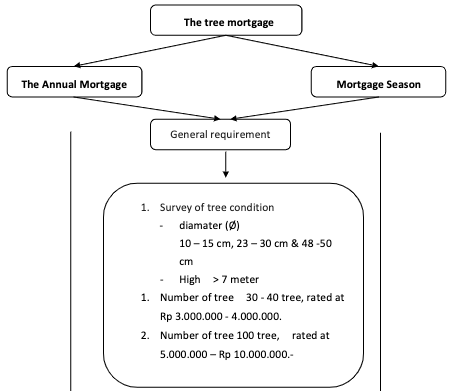Bound by debt: Nutmeg trees and changing relations between farmers and agents in a Moluccan agroforestry systems
Versions
- 2017-11-27 (2)
- 2017-11-27 (1)

Additional Files
Agroforestry is a land management system long practiced by communities in the Moluccas. The practice is commonly known as "Dusung", where one cash crop in particular, nutmeg, is interspersed throughout farmer groves. Farmers have faced a number of challenges in recent years, especially concerning a system of debt bondage inflicting undue losses upon them. This study aims to explain the involvement of farmers within the debt bondage system, otherwise known as the tree mortgage system. We utilize a case study methodology, whereby data were collected through interviews and participant observation and results analyzed using principal agent theory. Findings highlight that nutmeg farmers, what we call the Principal, incur high risks when debt bondage is applied by an Agent that has the increasing ability to deny and change the terms of an agreement. This occurs when Agents exploit information unavailable to farmers about nutmeg marketing prospects, which weakens farmer negotiating positions. Improving institutional support for contracts in the tree mortgage system could help to ensure a more equitable arrangement, improving the terms for nutmeg farmers, meanwhile also encouraging the continued preservation of the dusung system, which has long helped to manage forest resources sustainably.
Dinas Pertanian Prov Maluku. (2012). Prosiding : Agroforestry berbasis Pala untuk Kesejahteraan Masyarakat Maluku. In Presentasi :Strategi Pengembangan Komoditi Pala di Maluku (pp. 98–104). Ambon: Program studi Manajemen Hutan PPs Universitas Pattimura Ambon, KPM & Cordaid.
Febryano, I. G., Suharjito, D., Darusman, D., Kusmana, C., & Hidayat, A. (2014). The Roles and Sustainability of Local Institutions of Mangrove Management in Pahawang Island. Jurnal Manajemen Hutan Tropika, 20(2), 69. https://doi.org/10.7226/jtfm.20.2.69
Petrie, M. (2002). A Framework for Public Sector Performance Contracting. A Framework for Public Sector Performance Contracting, 117–153.
Salampessy, M. L., Bone, I., & Febryano, I. G. (2012). Performansi Dusung Pala Sebagai Salah Satu Agroforestri Tradisional di Maluku. Tengkawang, 2(2), 55–60. Retrieved from http://download.portalgaruda.org/article.php?article=111696&val=2344
Silaya.Th., Tjoa, M., Lelloltery, H., Siahaya, L., & Bone, I. L. M. (2012). Prosiding : Agroforestry berbasis Pala untuk kesejahteraan Masyarakat Maluku. In Agroforestry berbasis Pala di kepulauan Maluku (pp. 5–15). Ambon: Program studi Manajemen Hutan PPs Universitas Pattimura Ambon.
Zubayr, M., Darusman, D., Nugroho, B., & Nurrochmat, D. R. (2014). Principal-agent relationship in policy implementation of the use of forest area for mining activity , Indonesia, 3(January), 181–188. https://doi.org/10.11648/j.aff.20140303.17
Copyright (c) 2019 Forest and Society

This work is licensed under a Creative Commons Attribution 4.0 International License.
This is an open access journal which means that all contents is freely available without charge to the user or his/her institution. Users are allowed to read, download, copy, distribute, print, search, or link to the full texts of the articles in this journal without asking prior permission from the publisher or the author. This is in accordance with the BOAI definition of open access.
Submission of an article implies that the work described has not been published previously (except in the form of an abstract or as part of a published lecture or academic thesis), that it is not under consideration for publication elsewhere, that its publication is approved by all authors and tacitly or explicitly by the responsible authorities where the work was carried out, and that, if accepted, will not be published elsewhere in the same form, in English or in any other language, without the written consent of the Publisher. An article based on a section from a completed graduate dissertation may be published in Forest and Society, but only if this is allowed by author's(s') university rules. The Editors reserve the right to edit or otherwise alter all contributions, but authors will receive proofs for approval before publication.
Forest and Society operates a CC-BY 4.0 © license for journal papers. Copyright remains with the author, but Forest and Society is licensed to publish the paper, and the author agrees to make the article available with the CC-BY 4.0 license. Reproduction as another journal article in whole or in part would be plagiarism. Forest and Society reserves all rights except those granted in this copyright notice

